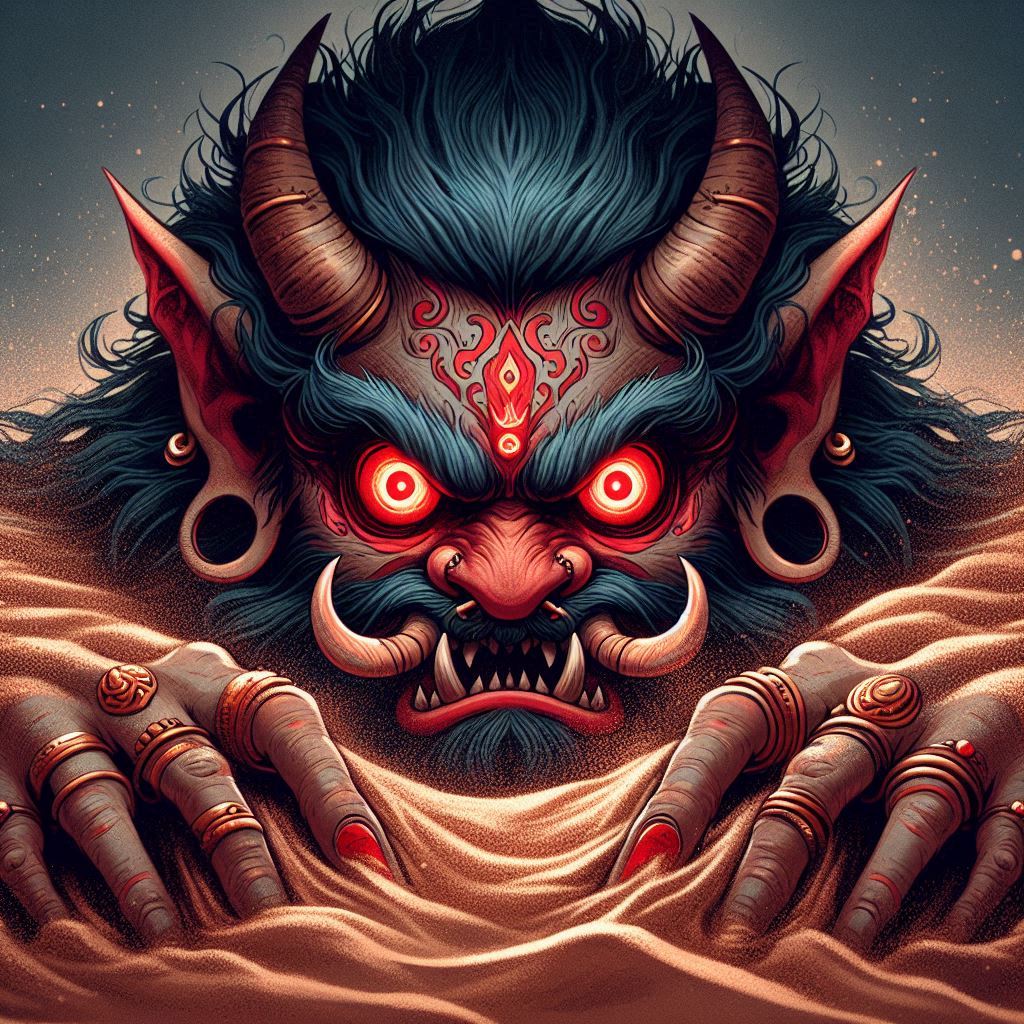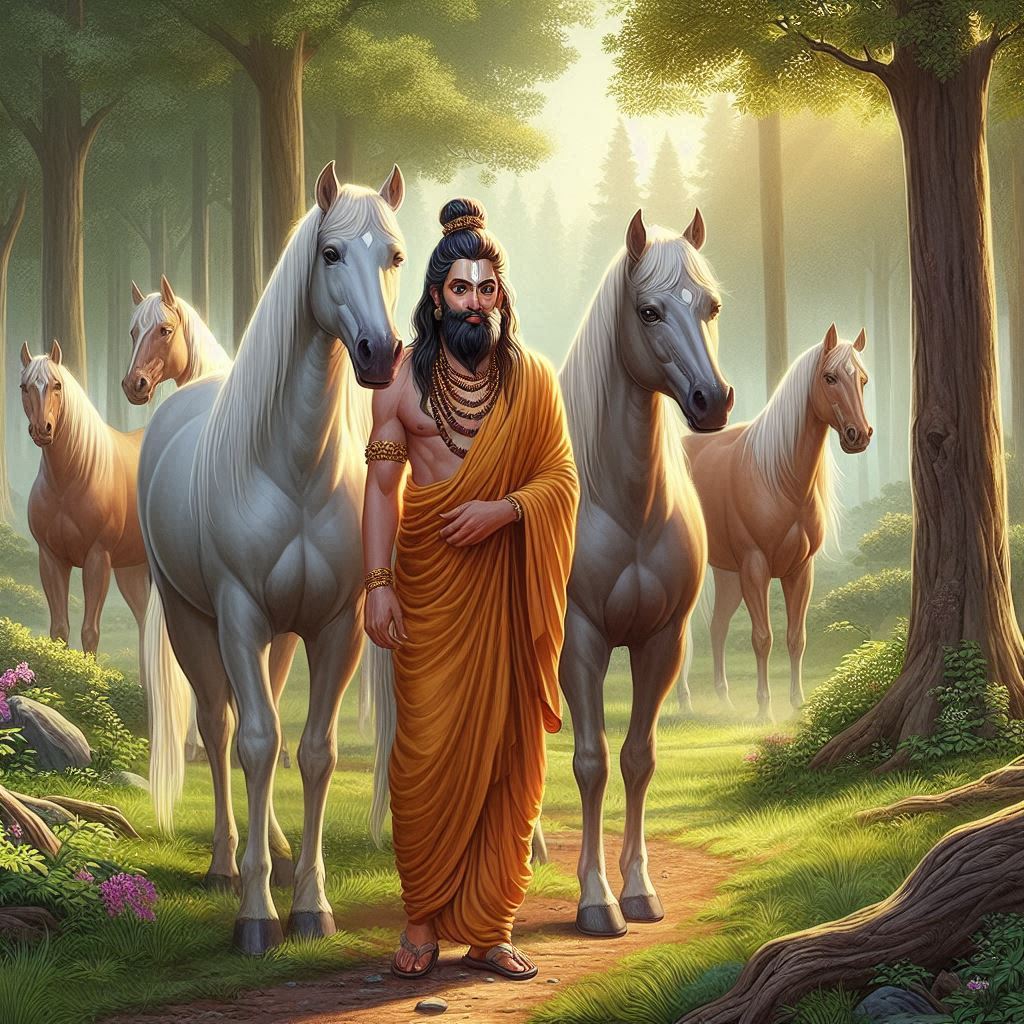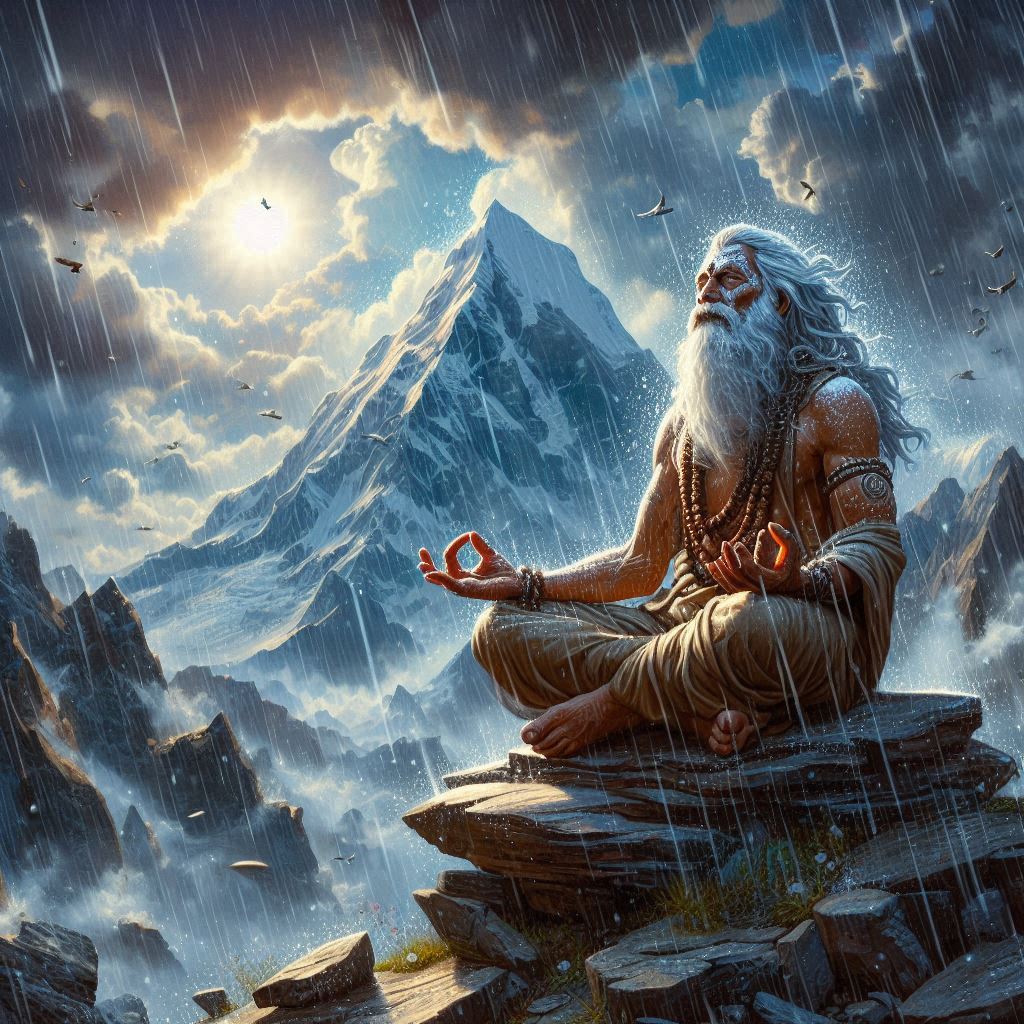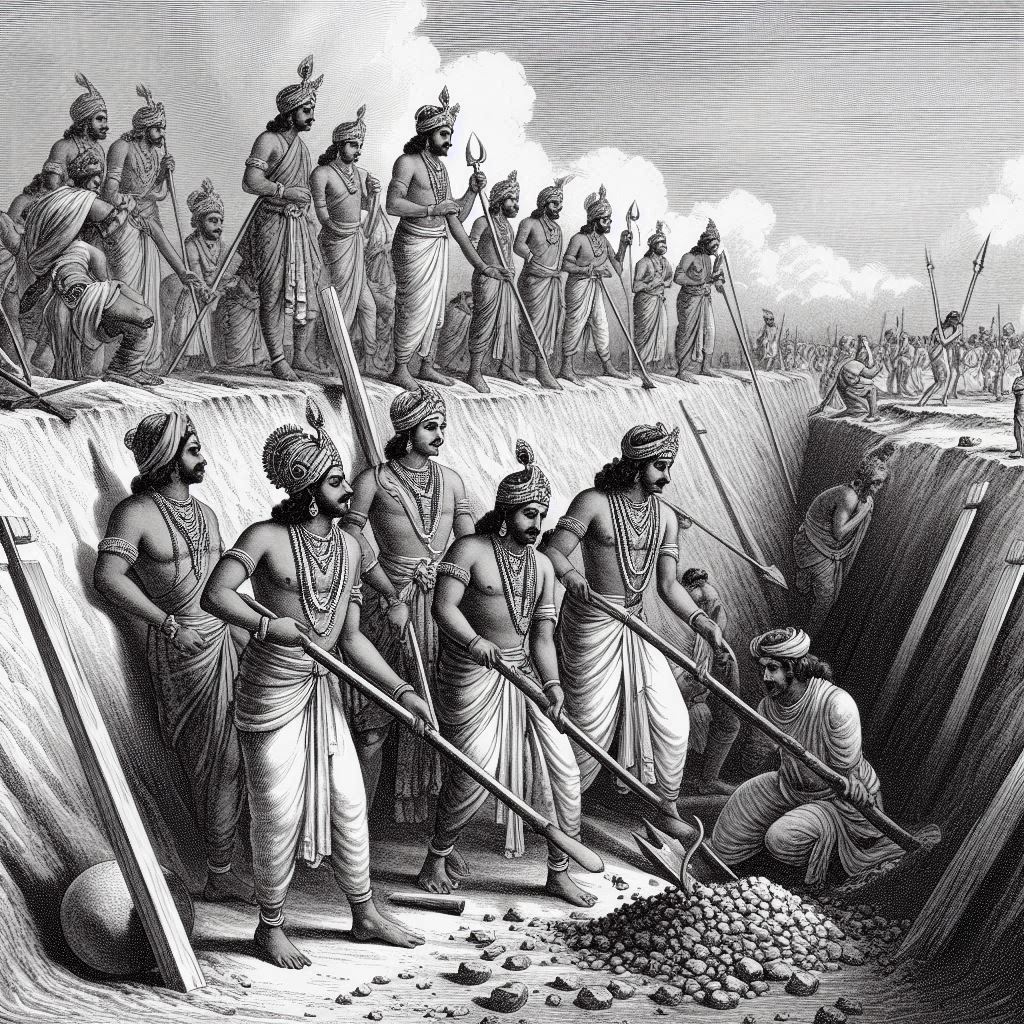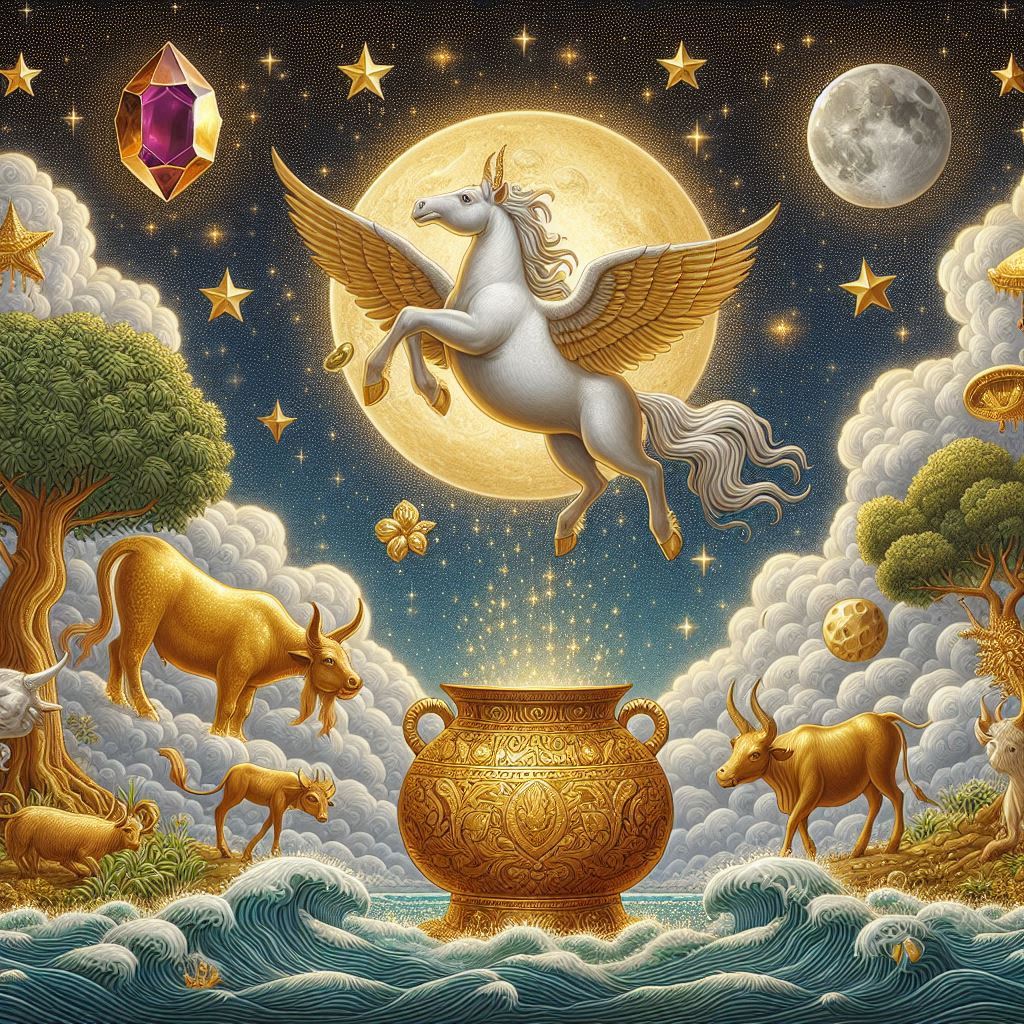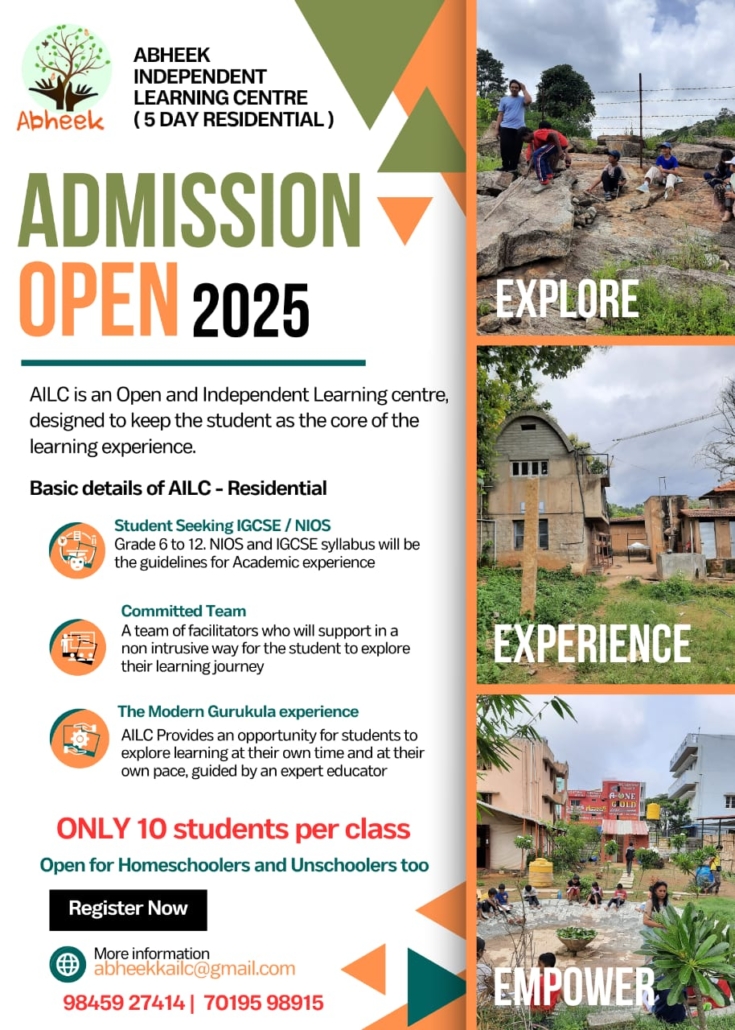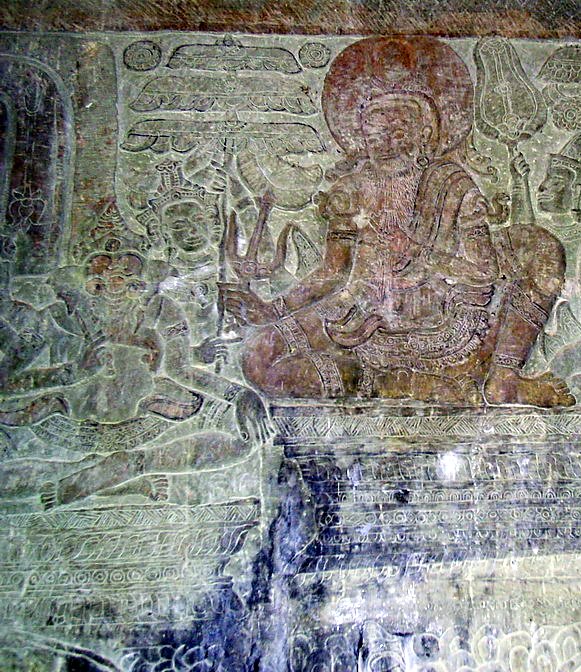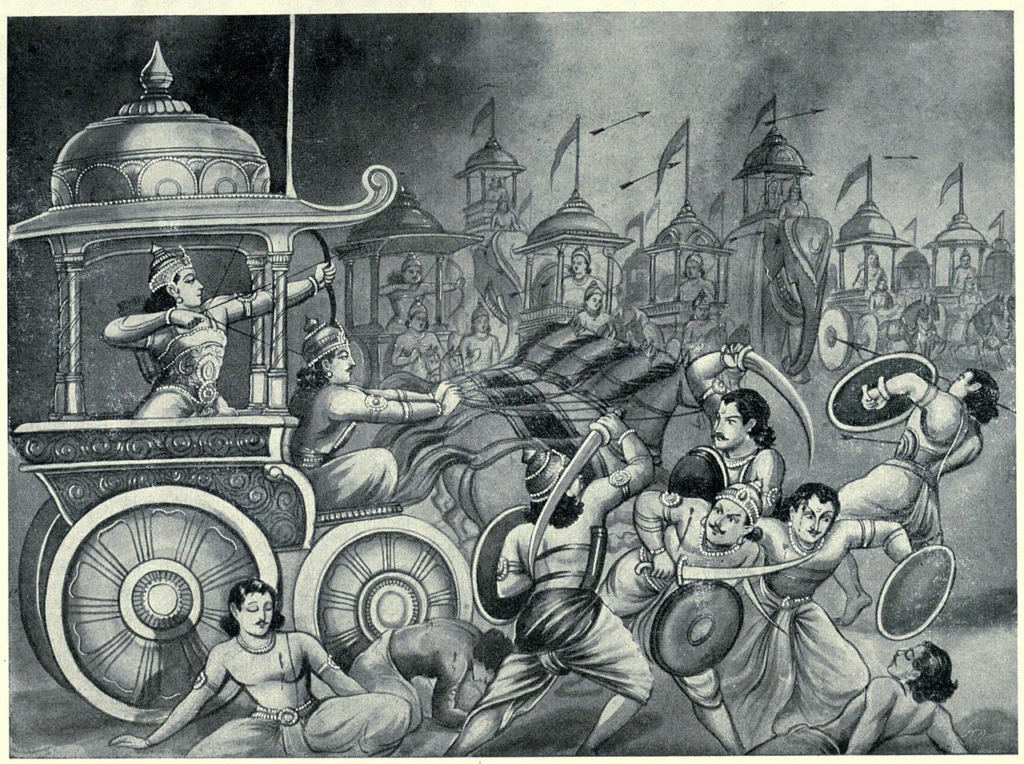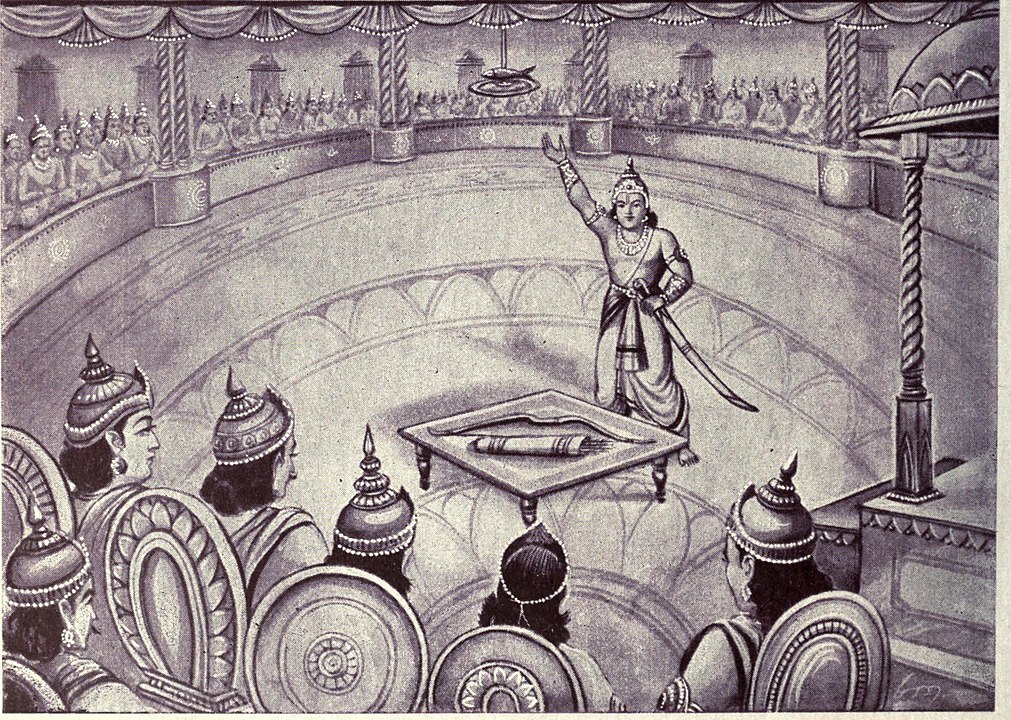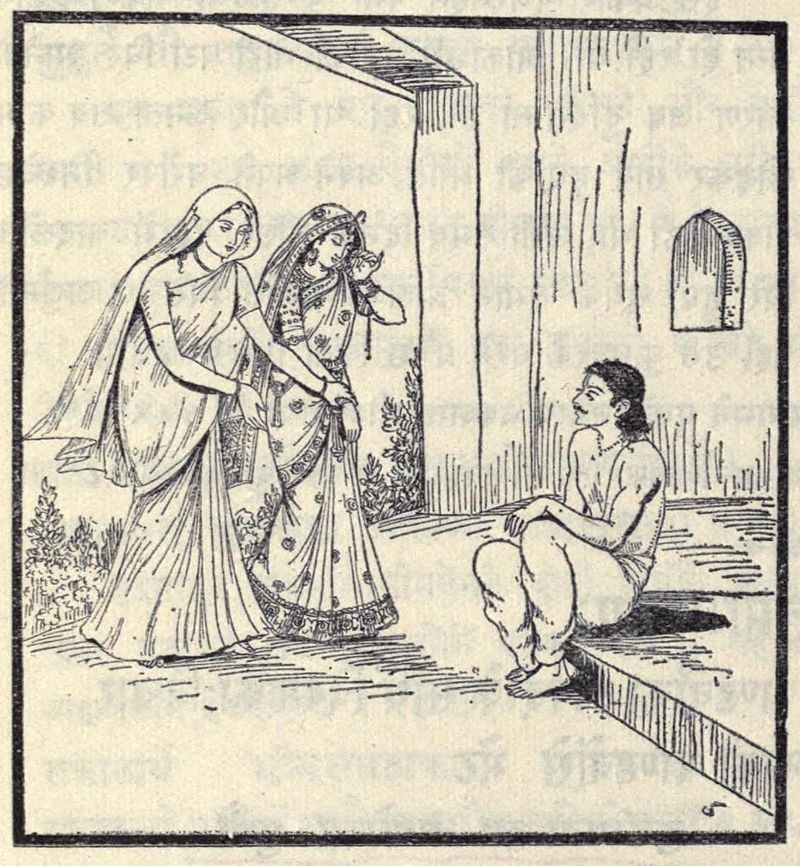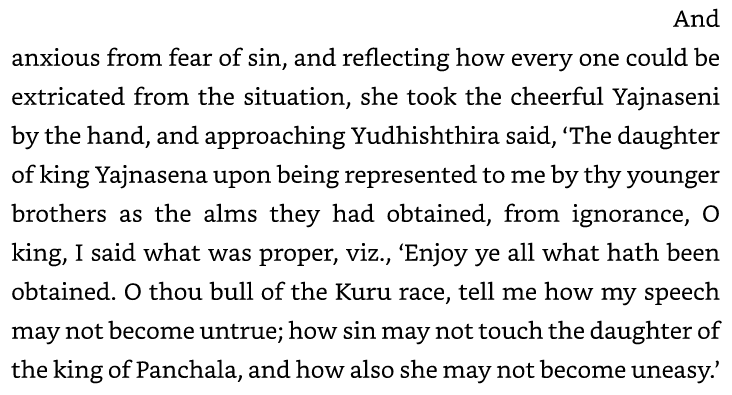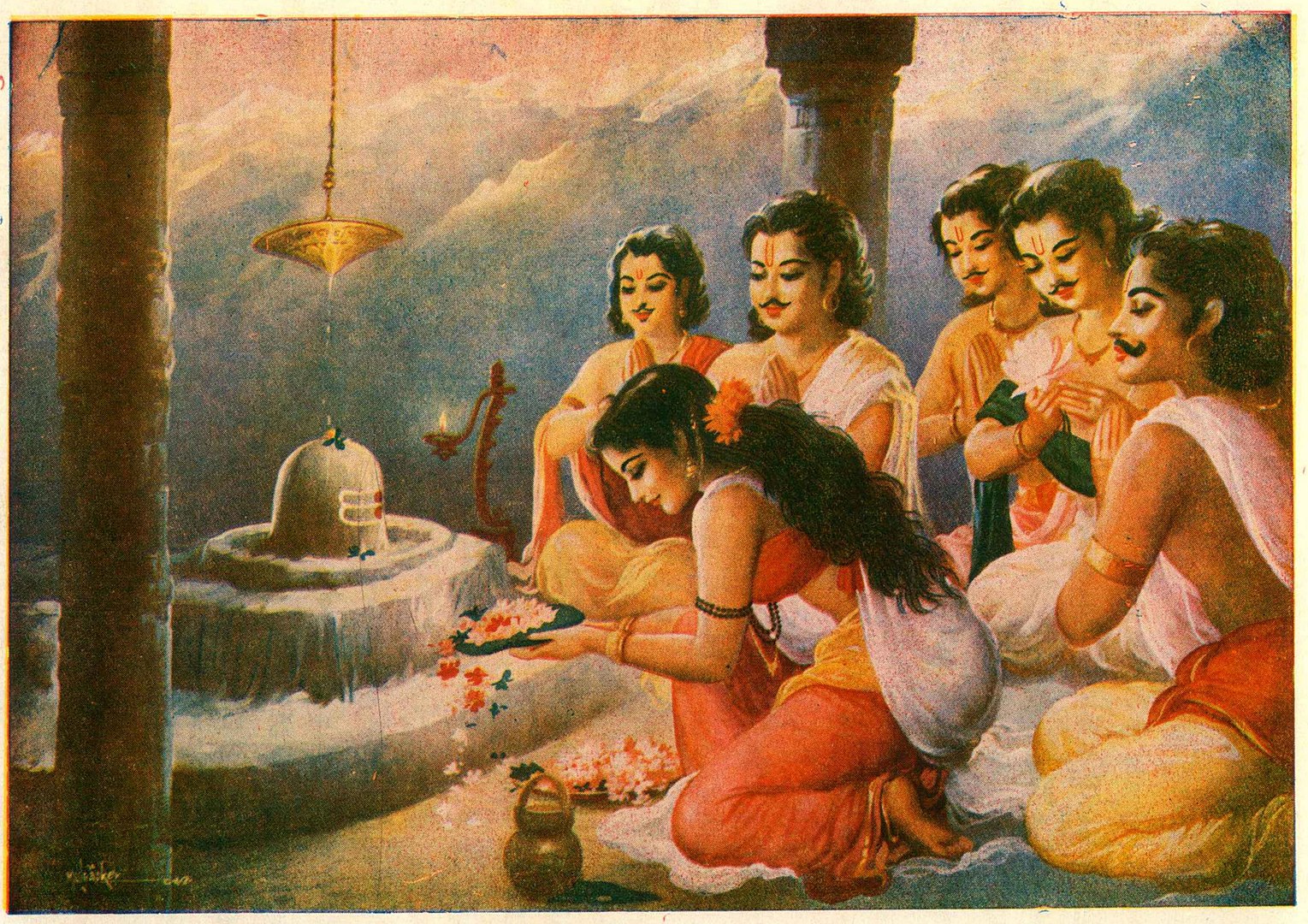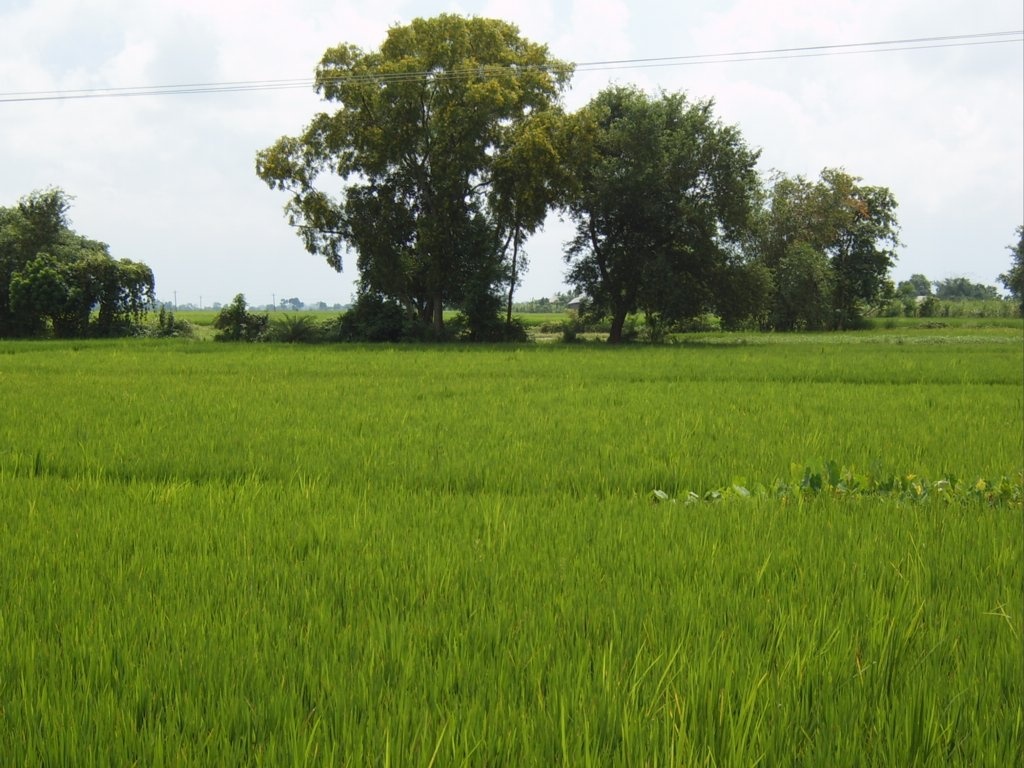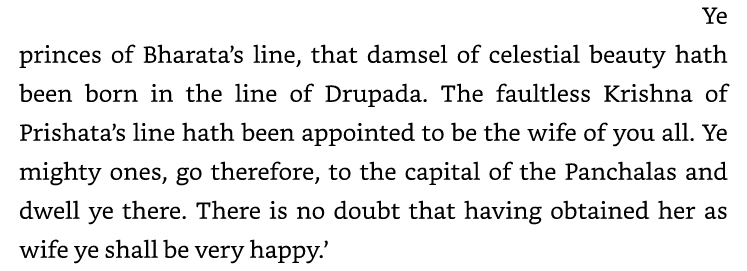Despite multiple rounds of advice, Duryodhana didn’t change his mind. Instead, he slapped his thigh to show he was capable of defeating anyone. To this, Narada said that it was rare for people to listen to well-wishers and their meaningful advice. He gave the example of how Galava faced defeat due to obstinacy.

A long time ago, Dharma wanted to test Rishi Vishwamitra. He took the form of Rishi Vashishta and went to Kaushika ashram, where Vishwamitra lived. He said he was extremely hungry and needed some food to eat. Vishwamitra cooked charu (rice with milk and honey, like a form of porridge) with a lot of care. This meant he couldn’t provide other offerings to the guest, and he also spent extra time on the dish. In the meantime, Dharma in Vashishta’s disguise consumed the food offered by other rishis. When Vishwamitra came with the bowl of porridge, he said he had eaten from others and asked the rishi to stay there. Then, Dharma left the ashram.
Vishwamitra stayed there, standing like a statue with the bowl in his hands. Years passed, but he didn’t move. Dharma arrived again after a hundred years and saw Vishwamitra in the same position. The porridge in the bowl was still warm and fresh, as if it had been made a few minutes ago. Dharma smiled and said that he was pleased with the rishi’s dedication and consumed the porridge.
This made Vishwamitra immensely happy. He had become a Brahmin with his tapasya, though he was born a Kshatriya. The rishi had a disciple named Galava, who served him for many years. Vishwamitra said to his disciple that he had achieved the goal of staying in the ashram and was free to go wherever he wanted.
However, Galava said he wanted to give guru dakshina to the rishi before he left. Vishwamitra said he had already paid the debts of learning through his service, so there was no need for anything else. However, Galava was adamant. The rishi asked to leave, but the disciple wouldn’t. At last, an irritated Vishwamitra told Galava to bring eight hundred white horses that had one black ear each.
Galava was delighted and excited to find what his guru wanted, only to realize it wasn’t an easy task. Pure white horses with a single black ear were rare and highly expensive. He began to worry so much that he stopped eating and became thin like a skeleton. He thought of himself as grateful for not being able to fulfill his guru’s wish and decided to take his own life. When he thought of giving up life to go to Vishnu’s abode, Garuda appeared in front of Galava. Garuda was the disciple’s friend and inquired about his troubles. When Galava shared his plight, Garuda promised to help him.
Garuda asked Galava to decide the direction in which they would travel first to find the horses. He then provided detailed information about the east (the gods, the events, origin, etc.). Galava asked to take him there. Garuda told his friend to sit on him, and they flew eastwards. Galava was terrified at the speed and requested Garuda to slow down. He continued to worry about the horses.
Garuda said the disciple didn’t seem wise if he thought he could die when he chose, and assured him that they would do their best to find the horses. They flew to Mount Rishabha, where a lady was performing tapasya. She was Shadili, a rishini. She welcomed them and gave them food to eat. Garuda and Galava felt sleepy and fell asleep. When they woke up, Garuda was shocked to see his wings gone. Galava asked if Garuda had any ill intentions.
Garuda said he thought he could take Shadili to Brahma’s abode, but not out of disrespect. He said it was due to his respect for her that he felt it might be a good move. He apologized to her and asked for forgiveness. Shadili told him that she knew what she wanted (which was why she lived alone on the mountain) and didn’t like being slighted by him (Garuda thought she was weaker and needed his help, which she didn’t). She advised Garuda not to censure a woman. Garuda’s wings reappeared as he bowed to her.
On their return journey, Galava and Garuda saw Vishwamitra. He reminded his disciple about the guru dakshina and said he would wait a little longer since he could see the disciple trying hard. This made Galava anxious and stressed.
Garuda thought about it and said he would take Galava to a king who was a friend. The king was rich and was likely to own such horses. Garuda took Galava to Yayati, the son of Nahusha. Galava agreed. They quickly flew to Yayati’s kingdom and met the king.
After the initial greeting, Garuda placed his request. Yayati thought he had to fulfill it in any way he could. However, his kingdom was as rich as before, and he didn’t have enough wealth or the kind of horses they wanted. Yayati conveyed the same to Garuda and instead offered his daughter Madhavi as a gift. He said the kings would be willing to pay a hefty bride price for her. In return, he wanted his daughter to have sons so that he could have some grandkids. Garuda told Galava to take Madhavi to the richest king on earth and make a deal.

Galava and Madhavi travelled to Haryashva Ikshvaku of Ayodhya. The Brahmin gave the king an offer of marriage in exchange for eight hundred white horses with one black ear each. Haryavarsha thought about the offer. He had no children and needed an heir. However, he also didn’t have as many horses as Galava wanted. So, he made a deal. He would give two hundred horses in exchange for marrying Madhavi and having a son through her.
Galava wasn’t sure, but Madhavi assured him to agree. She said she had a boon to become a virgin after giving birth, so he could take her to more kings afterward. The deal was made. Madhavi gave birth to Haryvarsha’s son, Vasumana. A while later, Galava came to take her to another king.
They went to Divodasa, the king of Kashi, and asked for six hundred horses in exchange for marrying Madhavi. However, the king also had only two hundred such horses. They made the same deal. Madhavi gave birth to Pratardana.
Galava visited them again so that he could take Madhavi to another king. This time, they went to Bhoja to meet King Ushinara. The Brahmin said the king could have two sons through her if he gave four horses. However, Ushinara also had only two hundred white horses with one black ear each. So, a similar deal was made. Madhavi gave birth to Shibi.
Galava then collected Madhavi and went to meet Garuda. He said he still needed another two hundred horses. Garuda told him to stop trying and said he wouldn’t be successful since there were no more such horses left on the earth. He advised Galava to take the horses and Madhavi to Vishwamitra. Garuda even accompanied them.
They went to Vishwamitra and gave him six hundred horses and Madhavi. The rishi accepted her. Madhavi gave birth to Ashtaka. Then, Galava came to take her back to Yayati and thanked Garuda for his help. He also thanked Madhavi and said her sons would one day save four kings and himself (Galava).
When Madhavi returned, Yayati planned a swayamwara for her, but she wasn’t interested. She decided to become a rishini and left for the forests to do tapasya. Yayati requested his daughter to reconsider her decision, but she refused.
Years later, when Yayati fell from his position in heaven for being arrogant about his tapasya, it was these four grandsons who caught him in their chariot and gave up their places in heaven so that he could regain his lost position and live in heaven forever.
Yayati was grateful for their selfless gesture and wanted to know who their mother was. He was delighted to see his daughter Madhavi as their mother. Even Galava reached the spot and gave one-eighth of the power of austerities for Yayati to go back to heaven (as a thank you for his help earlier). Back in heaven, Brahma Deva said Yayati had to fall due to his insolence and advised him not to repeat the mistake.
Concluding the story, Narada told Duryodhana that Galava and Yayati suffered due to their arrogance and obstinacy.
Of course, it did not affect Duryodhana.



